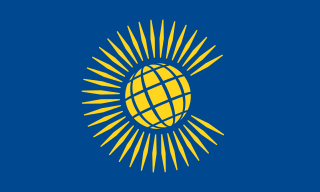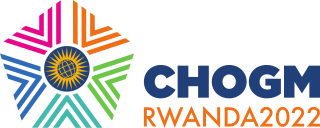Rwanda
The 2009 CHOGM was the first opportunity for countries to accede to the Commonwealth after the 2007 CHOGM accepted the report by the Committee on Commonwealth Membership, which established the current membership criteria. After the 2007 CHOGM, the Commonwealth sent a team to Rwanda to examine its eligibility, and recommended it be discussed at the 2009 meeting.
Rwanda was admitted despite the Commonwealth Human Rights Initiative (CHRI) finding that "the state of governance and human rights in Rwanda does not satisfy Commonwealth standards”, and that it “does not therefore qualify for admission". [6] CHRI also commented that: "It does not make sense to admit a state that already does not satisfy Commonwealth standards. This would tarnish the reputation of the Commonwealth and confirm the opinion of many people and civic organisations that the leaders of its governments do not really care for democracy and human rights, and that its periodic, solemn declarations are merely hot air." [6]
In Port of Spain, the Heads of Government agreed to accept Rwanda as a member, making it the 54th member, and the second without a direct constitutional tie to an existing member. Several other countries were expected to submit official applications to join, including Algeria, Madagascar, Sudan, and Yemen, [7] but they were not considered.
CHRI, [8] Human Rights Watch, [9] and Freedom House [10] have all found that the protection of democracy and human rights in Rwanda have declined since the country joined the Commonwealth.
The Commonwealth Heads of Government Meeting is a biennial summit meeting of the governmental leaders from all Commonwealth nations. Despite the name, the head of state may be present in the meeting instead of the head of government, especially among semi-presidential states. Every two years the meeting is held in a different member state and is chaired by that nation's respective prime minister or president, who becomes the Commonwealth Chair-in-Office until the next meeting. Queen Elizabeth II, who was the Head of the Commonwealth, attended every CHOGM beginning with Ottawa in 1973 until Perth in 2011, although her formal participation only began in 1997. She was represented by the Prince of Wales at the 2013 meeting as the 87-year-old monarch was curtailing long-distance travel. The Queen attended the 2015 summit in Malta and the 2018 summit in London, but was represented again by the Prince of Wales at the 2022 meeting in Rwanda.

The criteria for membership in the Commonwealth of Nations, which apply to current and prospective member states, have been altered by a series of documents issued over the past eighty-two years.
The Commonwealth Foundation (CF) is an intergovernmental organisation that was established by the Commonwealth Heads of Government in 1966, a year after its sister organisation, the Commonwealth Secretariat. The Foundation is located at Marlborough House in London, a former royal palace which was assigned for the use of these Commonwealth institutions by Her Majesty Queen Elizabeth II, the Head of the Commonwealth. As the Commonwealth agency for civil society, the Foundation is funded by 49 member states to support participatory governance through its programmes. The Foundation provides resources, grants and access to platforms to encourage better engagement between civil society and institutions of governance. Membership of the Commonwealth Foundation is voluntary and is separate from membership of the Commonwealth of Nations.

His Excellency Mahinda Buddhadasa Samarasinghe, is a former MP and the current Ambassador of Sri Lanka to the United States of America, Mexico and High Commissioner to Trinidad and Tobago. He was formerly a member of Parliament under Gotabaya Rajapaksa's Government, and the Sri Lanka Podujana Peramuna chief organiser for the Panadura Electorate in the Kalutara District.

The 2007 Commonwealth Heads of Government Meeting was the 20th Meeting of the Heads of Government of the Commonwealth of Nations. It was held in Kampala, Uganda, between 23 November and 25 November 2007, and was hosted by President Yoweri Museveni.

The 2005 Commonwealth Heads of Government Meeting was the 19th Meeting of the Heads of Government of the Commonwealth of Nations. It was held in Valletta, Malta, between 25 and 27 November 2005, and hosted by Prime Minister Lawrence Gonzi.
The Commonwealth Youth Programme, also known as CYP, is an international development agency working with young people between the ages of 15 and 29. Part of the Commonwealth Secretariat, CYP is active in the Commonwealth's 54 member countries. CYP has a head office in London with four centres in Africa, Lusaka, Zambia, Asia Chandigarh, India, Caribbean Georgetown, Guyana and Pacific Honiara, Solomon Islands. Currently there are Four Regional Directors and 16 programme officers plus support staff are working there.
The 1971 Commonwealth Heads of Government Meeting, officially known as the I Commonwealth Heads Meeting, and commonly known as Singapore 1971, was the first Meeting of the Heads of Government of the Commonwealth of Nations. It was held from 14 to 22 January 1971 in Singapore, and was hosted by that country's Prime Minister, Lee Kuan Yew.
The 1997 Commonwealth Heads of Government Meeting was the 15th Meeting of the Heads of Government of the Commonwealth of Nations. It was held in Edinburgh, Scotland, between 24 October and 27 October 1997, and hosted by Prime Minister Tony Blair.

The Commonwealth Chair-in-Office (CIO) is the Chair-in-Office of the Commonwealth of Nations, and is one of the main leadership positions in the Commonwealth. It is held by the host chairperson of the previous Commonwealth Heads of Government Meeting (CHOGM), and is maintained until the next CHOGM. Currently, the incumbent Chair-in-Office is also the President of Rwanda.

The Commonwealth of Nations, simply referred to as the Commonwealth, is a political association of 56 member states, the vast majority of which are former territories of the British Empire. The chief institutions of the organisation are the Commonwealth Secretariat, which focuses on intergovernmental aspects, and the Commonwealth Foundation, which focuses on non-governmental relations among member states. Numerous organisations are associated with and operate within the Commonwealth.

The 2011 Commonwealth Heads of Government Meeting, commonly known as CHOGM 2011, was the 22nd Meeting of the Heads of Government of the Commonwealth of Nations. Held in Perth, Western Australia, between 28 and 30 October 2011 and hosted by the Prime Minister Julia Gillard.
The 1993 Commonwealth Heads of Government Meeting was the 13th Meeting of the Heads of Government of the Commonwealth of Nations. It was held in Limassol, Cyprus, between 21 October 1993 and 25 October 1993, and was hosted by that country's President, Glafcos Clerides.

The majority of the countries of the Commonwealth of Nations, formerly known as the British Commonwealth, still criminalise sexual acts between consenting adults of the same sex and other forms of sexual orientation, gender identity and expression. Homosexual activity remains a criminal offence in 32 of the 56 sovereign states of the Commonwealth; and legal in only 24.

The 2013 Commonwealth Heads of Government Meeting was the 23rd Meeting of the Heads of Government of the Commonwealth of Nations. It was held in Colombo, Sri Lanka, from 15 to 17 November 2013. Commonwealth leaders agreed on Sri Lanka as the 2013 host for the meeting when they met in Port of Spain, Trinidad and Tobago, in 2009. Sri Lanka, which was originally slated to host the summit in 2011, was accused of committing atrocities during the Sri Lankan civil war and the summit was instead held in Perth, Australia; Colombo was given the 2013 summit instead. The leaders of Canada, Mauritius, and India boycotted the summit, citing alleged human rights violations by Sri Lanka against its Tamil minority. Protests were also banned during the summit. President Mahinda Rajapaksa summarised the summit's events as: "Issues covered in the communique include development, political values, global threats, challenges and Commonwealth cooperation." However, the meeting was overshadowed by controversy over Sri Lanka's human rights record and the alleged war crimes during the final stages of the civil war. This was the first time in 40 years that the Head of the Commonwealth, Queen Elizabeth II, was not present at the CHOGM.

The 2015 Commonwealth Heads of Government Meeting, also known as CHOGM 2015 was the 24th Meeting of the Heads of Government of the Commonwealth of Nations. It was held in Malta from 27 to 29 November. Sri Lankan President Maithripala Sirisena handed the position of Commonwealth Chair-in-Office to Maltese prime minister Joseph Muscat at the meeting.

The 2018 Commonwealth Heads of Government Meeting, also known as CHOGM 2018, was the 25th Meeting of the Heads of Government of the Commonwealth of Nations. It was held in the United Kingdom. The meeting had been planned to have been held by Vanuatu at the end of 2017, but was moved to the United Kingdom after the impact of Cyclone Pam on the infrastructure of Vanuatu. The meeting was then postponed to April 2018 due to other international commitments.

The 2022 Commonwealth Heads of Government Meeting, also known as CHOGM 2022, was the 26th Meeting of the Heads of Government of the Commonwealth of Nations. The meeting was originally scheduled for 26–27 June 2020 in Kigali, Rwanda preceded by various fora between 22 and 25 June, but was postponed twice due to the COVID-19 pandemic. On 31 January 2022, it was announced that the meeting would be held on 24 and 25 June 2022 and the pre-meeting fora held from 20 to 23 June.

Seventh Summit Conference of Heads of State or Government of the Non-Aligned Movement on 7–12 March 1983 took place in New Delhi in India, one of the founders and leading members of the Non-Aligned Movement. The summit followed the 1979 summit in Havana, Cuba at which confrontation between moderate member states led by SFR Yugoslavia and India and radical states led by Cuba led the movement into crisis. The keynote address delivered by Prime Minister of India Indira Gandhi. At the summit in New Delhi Bahamas, Barbados, Colombia and Vanuatu were admitted as new member states, Papua New Guinea, Antigua and Barbuda as observers and Dominican Republic as an guest state. Cambodia was absent from the meeting due to rival delegations controversy, Saint Lucia failed to send a delegation while Luxembourg's request for an guest status was rejected on formalistic deadline grounds. 1,500 journalists followed the event.
Second Summit Conference of Heads of State or Government of the Non-Aligned Movement on 5–10 October 1964 in Cairo, United Arab Republic (Egypt) was the second conference of the Non-Aligned Movement which followed the Belgrade Conference of 1961 and preceded the Lusaka Conference of 1970. The city of Cairo was selected as a host of the summit conference at the preparatory meeting held in Colombo, Ceylon, on March 23, 1964. At the beginning of the conference the chairmanship of the Movement was transferred from the President of Yugoslavia Josip Broz Tito to the President of Egypt Gamal Abdel Nasser.













